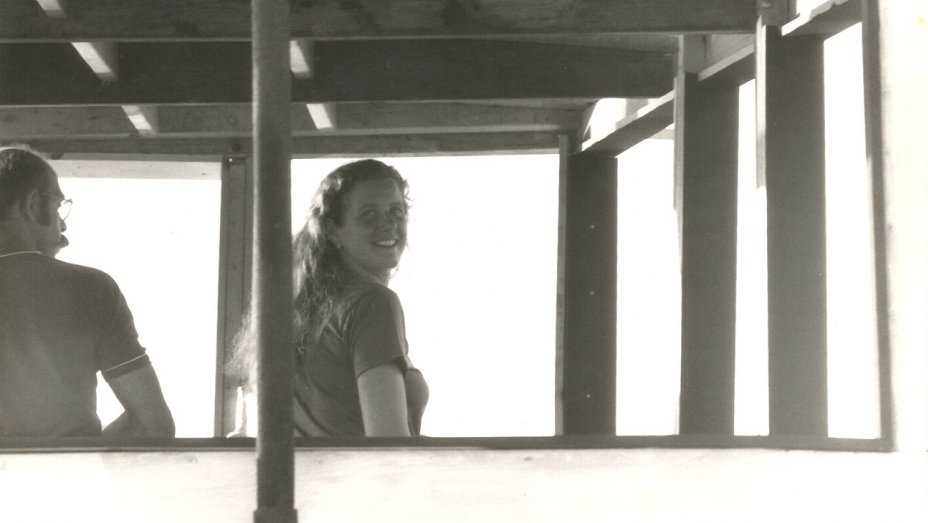Doc Corner: 'God Knows Where I Am'
 Tuesday, April 18, 2017 at 11:30AM
Tuesday, April 18, 2017 at 11:30AM by Glenn Dunks
 The discovery of a woman’s lifeless body in an abandoned New Hampshire farmhouse next to a diary that reads how she, if found dead, was the victim of domestic abuse is the starting point for Jedd and Todd Wider’s God Knows Where I Am. These words begin the story of how Linda Bishop came to be in the house, a tragic entry point to a story that takes on further inescapably sad connotations the more we learn about her and what lead to her body lying dead on the hardwood floors of an empty house after the worst winter on record.
The discovery of a woman’s lifeless body in an abandoned New Hampshire farmhouse next to a diary that reads how she, if found dead, was the victim of domestic abuse is the starting point for Jedd and Todd Wider’s God Knows Where I Am. These words begin the story of how Linda Bishop came to be in the house, a tragic entry point to a story that takes on further inescapably sad connotations the more we learn about her and what lead to her body lying dead on the hardwood floors of an empty house after the worst winter on record.
It’s not exactly a spoiler to note that domestic violence is not what brought Linda’s life to an end. Perhaps she thought it was...
It’s not entirely clear what she was thinking. Linda suffered from schizophrenia, but through a troubling series of events that failed to adequately assess her wellbeing, ended up alone and without medication, seeking refuge in the house she lived in as a child, feeding on apples from the garden that she picks under the cover of darkness, barely keeping warm from the meager heat generated from a pilot light system that had never been turned off.
Her diaries, written daily, are narrated with an appropriate lightness that belies their broader connotations by Lori Singer. It was no doubt deliberate that the vocals recall the soothing yet oddly sinister narration of Sarah Koenig’s Serial podcast. They provide the framework of a film that its directors and cinematographer Gerardo Puglia use to hang a series of evocative and frequently haunting tableaus; haunting minimalist images that never distract from Linda’s words, complimenting each other with sequences of little more than a camera slowly sneaking through this house, crabapples strewn about on floors and vacant tables, their flesh slowly rotting like they’re attempting to recreate a still life painting by Caravaggio or de Zurbaran.

Talking heads appear throughout (as do occasional archival material from her healthier times in life) of her family members who feel failed by a system – the sister notes how she drives past that house every day on her way to work, while Linda’s brother notes a visit to the house to collect some possessions in which they felt the presence of a visitor, but no proof (she was hiding in the attic) – as well as the occasional doctor who were a part of Linda’s story. We hear the stories of her belief that she was being followed by the Chinese mafia, and the restaurant patron she was married to who, in fact, was already married with children.
The full story is one of unending edge-of-your-seat shock. Gripping despite its simplicity, surprising right up to the very end as more and more layers of Linda’s story and her death are revealed. It’s a respectful film, and a quiet one. Its more salacious elements thankfully handled with delicacy rather than grotesque recreations. Save that for the feature adaptation, which Melissa Leo should definitely spearhead.
Like many films about the ravages of mental illness, God Knows Where I Am leaves lingering questions hovering in the ether. Questions about our own loved ones who maybe we haven’t heard from in too long, or that person on the street you pass on your way to the subway. It’s a film that stays in the memory long after its over, the loneliness of its central subject a ghost in the memory once the credits have rolled. That it doesn’t offer solutions shouldn’t be seen as a shortfall of the Widers’ film. Rather, it hints that Linda’s story has no answers while focusing on her. This is her story finally being told.
 Doc Corner,
Doc Corner,  Melissa Leo,
Melissa Leo,  documentaries
documentaries 


Reader Comments